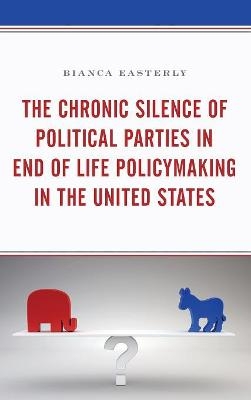
The Chronic Silence of Political Parties in End of Life Policymaking in the United States
Seiten
2019
Lexington Books (Verlag)
978-1-4985-5608-8 (ISBN)
Lexington Books (Verlag)
978-1-4985-5608-8 (ISBN)
Questions of whether and when life should end are controversial but are they also partisan? The Chronic Silence of Political Parties in End of Life Policymaking in the United States retraces the legislative history of the right to die movement to examine the impact of the absence of the two major political parties on the diffusion of innovation.
In recent decades, the level of moral acceptability of choice at the end of life has reached record highs. Legislative responsiveness to public opinion, however, has resulted in far fewer and much slower adoption patterns. For example, if a growing number of Americans support aid in dying legislation, why are so few states adopting them? While extensive research that explores matters of death and dying from the medical, legal, and religious perspectives exists, scholars have yet to consider the role of politics in explaining end of life policy adoption patterns. The Chronic Silence of Political Parties in End of Life Policymaking in the United States retraces the right to die movement’s legislative history from its beginnings to the adoption and diffusion of its most recent innovations—the Physician Orders for Life-Sustaining Treatment (POLST) Paradigm and death with dignity—to identify the various forces that hinder its progress.
In recent decades, the level of moral acceptability of choice at the end of life has reached record highs. Legislative responsiveness to public opinion, however, has resulted in far fewer and much slower adoption patterns. For example, if a growing number of Americans support aid in dying legislation, why are so few states adopting them? While extensive research that explores matters of death and dying from the medical, legal, and religious perspectives exists, scholars have yet to consider the role of politics in explaining end of life policy adoption patterns. The Chronic Silence of Political Parties in End of Life Policymaking in the United States retraces the right to die movement’s legislative history from its beginnings to the adoption and diffusion of its most recent innovations—the Physician Orders for Life-Sustaining Treatment (POLST) Paradigm and death with dignity—to identify the various forces that hinder its progress.
Bianca Easterly is assistant professor of political science at Lamar University.
Chapter One – Historical Beginnings: The Policy Entrepreneurs of the Early Aid in Dying Movement
Chapter Two Modern Renewal
Chapter Three: Interest Groups
Chapter Four: The Courts
Chapter Five: Healthcare Coalitions
Chapter Six: End of Life Policies Today and Tomorrow
| Erscheinungsdatum | 10.05.2021 |
|---|---|
| Verlagsort | Lanham, MD |
| Sprache | englisch |
| Maße | 161 x 231 mm |
| Gewicht | 367 g |
| Themenwelt | Recht / Steuern ► EU / Internationales Recht |
| Recht / Steuern ► Öffentliches Recht ► Verfassungsrecht | |
| Recht / Steuern ► Privatrecht / Bürgerliches Recht ► Medizinrecht | |
| Sozialwissenschaften ► Politik / Verwaltung ► Staat / Verwaltung | |
| Sozialwissenschaften ► Soziologie | |
| ISBN-10 | 1-4985-5608-6 / 1498556086 |
| ISBN-13 | 978-1-4985-5608-8 / 9781498556088 |
| Zustand | Neuware |
| Haben Sie eine Frage zum Produkt? |
Mehr entdecken
aus dem Bereich
aus dem Bereich
Buch | Hardcover (2024)
C.H.Beck (Verlag)
75,00 €


